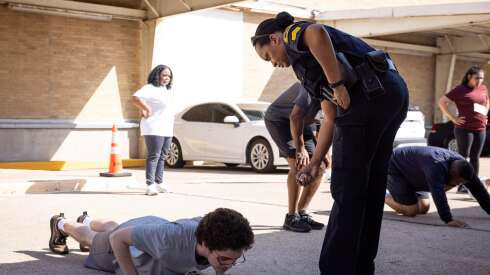News
Indiana state Rep. Jim Lucas. As states struggle with the rising cost and scarcity of lethal injection drugs, Lucas is among a growing number of Republican lawmakers calling for alternative execution methods, including the firing squad. Indiana currently authorizes only lethal injection. (Indiana Capital Chronicle)
Despite warnings that the law criminalizes low-risk behaviors, the state remains one of just five that impose lengthy sex offender registration requirements after conviction.
While U.S. housing stock is up 29 percent, Las Vegas stands out as the epicenter of the trend, with listings soaring 77 percent across the metro area.
An economist who helped convince the Biden administration to spend more on research bemoans the deep cuts proposed by President Donald Trump.
Syracuse, N.Y., is having renewed success. Mayor Ben Walsh helped make it happen.
Employee-created AI tools process purchase receipts, identify patterns in 311 requests, examine parking challenges and more.
The net number of people who have moved out of Mississippi since 2010. That’s enough to form the state’s second-largest city — one made up entirely of college-educated adults ages 22 to 50. The data highlights the state’s ongoing brain drain, as young professionals continue to leave in search of better opportunities elsewhere. (Mississippi Today)
Illinois state Rep. John Cabello. While emphasizing that he loves his state, Cabello, the assistant Republican leader in the state House, decried legislation passed by the Democratic majority, specifically calling out recent passage of a banking bill he said will be harmful. Cabello was speaking to fellow legislators gathered from around the country for the American Legislative Exchange Council’s annual meeting.
Oversight may be inevitable after millions of dollars in fraud, but legislators are arguing about how far accountability measures should go.
Some Republicans have expressed concern that the National Education Association has veered into partisan politics and no longer merits federal endorsement.
Beaverton, Ore., is looking for new ways to support cooperative housing development for senior residents. It’s among 50 finalist cities in the Bloomberg Philanthropies Mayors Challenge.
A housing assistance program “proved to be extremely vulnerable to fraud,” according to an FBI affidavit.
The national decline in fertility in 2023, compared to the 2011–2020 average...
Community activist Elena Schlossberg. Describing local resistance to the surge of data center construction in Virginia, Schlossberg contends that industrial-scale tech infrastructure — often planned with insufficient community input — has turned her region into a case study for poor planning. (NPR)
In the absence of national policy, at least 28 states have set standards on cheating, safety and responsible AI use in schools.
Despite widespread damage from a 2023 storm, only eight homeowners have cash in hand, with federal roadblocks delaying relief.
The organization has shaped state laws for 50 years. It may be at the height of its influence.
The right policies can help more regions take advantage of AI for economic growth and prepare against some of its harms, according to a new report.
Ideas are now flowing down from Washington into the states, rather than the other way around.
Over recent decades we’ve moved toward a much more effective and humane system to deal with youth crime. Evidence and research, not hyperbole and hysteria, should be guiding today’s debate.
Judge Anna Hamburg-Gal. The Chicago Board of Election Commissioners had argued that the Illinois election code barred its employees from unionizing, but Hamburg-Gal argued that joining a union can be motivated by salary and other workplace concerns and was not necessarily political or partisan in nature.
The state agriculture department has banned the sale or purchase of English ivy, a fast-growing vine that can kill trees and harm native plants.
Most people are able to apply online but only about a third of those who call reach a live person. The number of call center employees has dropped by nearly 40 percent over the past two years.
There’s a reason so many local governments rely on the council-manager system: It balances democratic accountability with operational expertise.
Daniel Perez, the Florida Speaker, has been combatting the governor over various proposals and personal ambitions all year.
We need competent responders every hour of the day, every day of the week. But we often don’t have them.
Jennifer Pahlka, who served as U.S. deputy chief technology officer under President Barack Obama. The Trump administration is seeking ways to implement artificial intelligence to take over many functions currently performed by humans. For instance, the Pentagon is already using AI to help officers distinguish between combatants and civilians in military theaters. Many more applications, from tax audits to airport security, are expected. (Washington Post)
The city has a goal of hiring 4,000 more officers by 2029. Recruiting classes are starting to increase thanks to higher salaries and other expanded hiring efforts.
Most Read
































